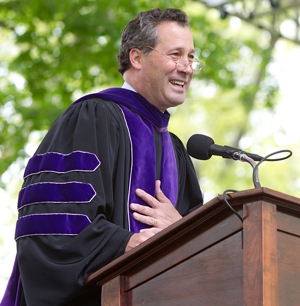
“It remains our students’ responsibility to learn, engage and change the world. It remains the faculty’s to inform teaching with scholarship that is deep but also broad—in the way it can be only at a great liberal arts college. And it remains our duty, together, to serve the community, and thereby learn further; to work with those less privileged. By serving our core mission of education, we serve beyond it.”
—Anthony W. Marx, Inaugural Address, October 26, 2003
Anthony W. Marx was Amherst’s president from 2003-2011. As president, he focused on realizing Amherst’s aim to be both the most selective and the most diverse liberal arts college, ensuring access for the most talented students of any economic background, curricular renewal and connecting the curriculum to research and internship/service experiences to inspire lifelong engagements. In July 2011, he became President of the New York Public Library.
Marx served for 13 years on the faculty at Columbia University, where he was professor and director of undergraduate studies of political science. He also has established and managed programs designed to strengthen secondary school education in the U.S. and abroad. During his last year at Columbia, he served as director of the Gates Foundation-funded Early College High School Initiative at the Woodrow Wilson National Fellowship Foundation, which established model public high schools as partnerships between school systems and universities. He founded the Columbia Urban Educators Program, a public school teacher recruitment and training partnership. In the 1980s, he helped found Khanya College, a South African secondary school that prepared more than 1,000 black students for university.
Marx is the author of more than a dozen scholarly articles and three books, Lessons of Struggle: South African Internal Opposition, 1960-1990 (Oxford University Press, 1992), Making Race and Nation: A Comparison of the United States, South Africa and Brazil (Cambridge University Press, 1998) and Faith in Nation: Exclusionary Origins of Nationalism (Oxford University press, 2003). Making Race and Nation received the American Political Science Association’s 1999 Ralph J. Bunche Award (co-winner for the best book on ethnic and cultural pluralism) and the American Sociological Association’s 2000 Barrington Moore Prize (for the best book of the preceding three years in comparative-historical sociology). Marx received a John Simon Guggenheim Fellowship in 1997. He also has received fellowships from the United States Institute of Peace, the National Humanities Center, the Howard Foundation and the Harry Frank Guggenheim Foundation.
Marx attended Wesleyan and Yale, where he graduated magna cum laude with a B.A. degree in 1981. He received his M.P.A. degree from the Woodrow Wilson School at Princeton University in 1986, then earned M.A. and Ph.D. degrees from Princeton in 1987 and 1990.